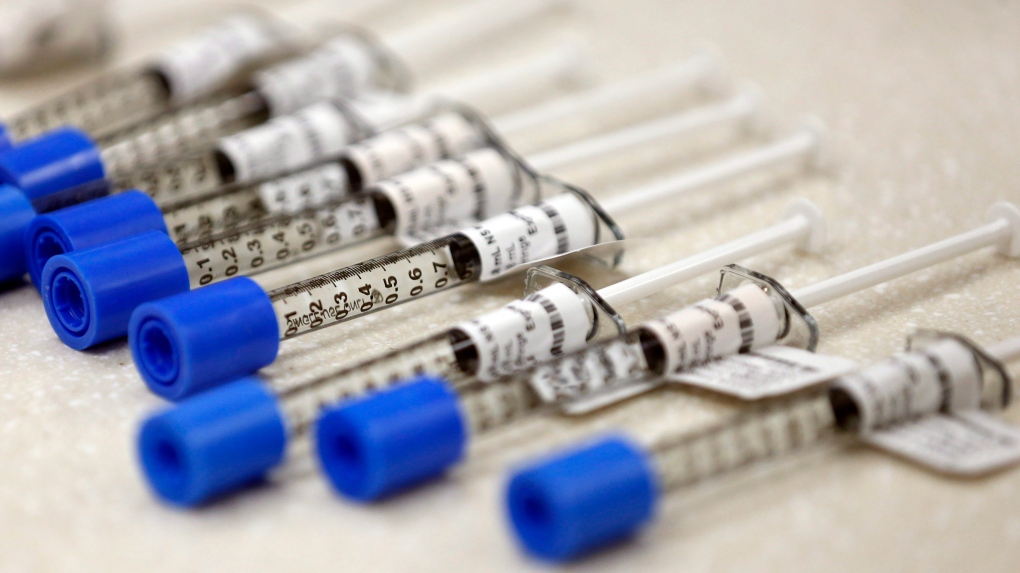
Missing 3-year-old boy found dead in creek in Mississauga, Ont.: police
A three-year-old boy has been found dead a day after he went missing in a park in Mississauga, Ont., Peel police say.
Researchers at Indiana University say a modified version of cannabidiol, a chemical found in cannabis, could help reverse the effects of overdoses from drugs such as fentanyl.
In the study published in the Journal of Medicinal Chemistry on July 12, researchers hoped that the new discovery could lead to a new way to reverse overdoses either through a new product or by working synchronously with naloxone.
According to the Canadian government’s website, an average of 20 people die per day due to apparent opioid toxicity, with synthetic opioids like fentanyl being a major contributor. While naloxone is widely used as an antidote for opiate overdoses, it is found to be less effective against the synthetic opioids in the fentanyl category.
Researchers say in order to counteract the effects of an overdose, your body's opioid receptors need something else to bind to.
"The synthetic opiates bind very tightly to the opioid receptors," senior research scientist for the Gill Center for Biomolecular Science Alex Straiker said in a press release published on Tuesday.
"Naloxone must compete with opioids for the same binding site in the central nervous system to cancel out an overdose. But during a fentanyl overdose, naloxone and fentanyl bind to different sites, meaning there is no competition. We wanted to see if a negative allosteric modulator could reverse the fentanyl effects."
According to the University of Michigan, an allosteric modulator is a molecule that interacts with other molecules to the degree that it affects their behaviour.
Researchers conducted the experiment by testing 50 chemical compounds to determine which ones exhibited the most potential as a tool to cancel out the effects of fentanyl.
Researchers found cannabidiol, or CBD, "could behave as a negative allosteric modulator at the binding site,” however, high concentrations were needed during the first phase of testing.
After modifying the structure of the CBD to be more effective, researchers found that tests done on blood or tissue samples successfully reversed the effects of fentanyl.
"We've identified structural parts that are important for the desired antidote effect," Straiker explained. "Some of these compounds are much more potent than the lead. We’ve worked with a third lab to model the binding site that may help identify additional compounds moving forward."
According to the study, the next important step is for researchers to test their findings on live subjects in order to determine whether they can reverse the effects of respiratory depression, which is what happens to your body during a drug overdose.
Reporting for this story was paid for through The Afghan Journalists in Residence Project funded by Meta.

A three-year-old boy has been found dead a day after he went missing in a park in Mississauga, Ont., Peel police say.
Against the rainy Paris night sky, Celine Dion staged the comeback of her career with a powerful performance from the Eiffel Tower to open the Olympic Games.
Premier Danielle Smith said Friday afternoon in Hinton while weather conditions are cooler, the Jasper fire is still considered out of control and that Jasper residents can expect to be away from their homes 'for several weeks.'
An Irish museum will withdraw a waxwork of singer-songwriter Sinéad O'Connor just one day after installing it, following a backlash from her family and the public, it told CNN in a statement on Friday.
A Winnipeg senior is getting soaked with a six-figure water bill.
Nearly two weeks after Donald Trump's near assassination, the FBI confirmed Friday that it was indeed a bullet that struck the former president's ear, moving to clear up conflicting accounts about what caused the former president's injuries after a gunman opened fire at a Pennsylvania rally.
Orillia OPP arrested and charged a driver with impaired driving after flashing their high beams.
A powerful Mexican drug cartel leader who eluded authorities for decades was duped into flying into the U.S., where he was arrested alongside a son of Joaquin "El Chapo" Guzman, according to a U.S. law enforcement official familiar with the matter.
The lawyer for a former judge whose claims to be Cree were questioned in a CBC investigation says his client is not considering legal action against the broadcaster after the Law Society of British Columbia this week backed her claims of Indigenous heritage.

As fire threatened people in Jasper National Park, Colleen Knull sprung into action.
Video posted to social media on Thursday morning appears to show the charred remains of a Jasper, Alta., neighbourhood.
A Saskatchewan-born veteran of the Second World War was recently presented with France's highest national order.
A local First Nations elder and veteran is helping to bring the Ojibwe language to a well-known film for the first time.
A cat who fled her Montreal home nearly a decade ago has been reunited with her family after being found in Ottawa.
A woman in Waterloo, Ont. is out thousands of dollars for a car crash she wasn’t involved in.
A swarm of bees living in a lamppost in Winnipeg’s Sage Creek neighbourhood has found a new home for its hive.
Around 100 acres of Manitoba Crown Land near the Saskatchewan border is being returned to the Métis community.
Nova Scotia is suspending the licensed Cape Breton moose hunt for three years due to what the province is calling a “significant drop” in the population.
 File photo shows syringes of the opioid painkiller fentanyl in an inpatient pharmacy. (AP Photo/Rick Bowmer, File)
File photo shows syringes of the opioid painkiller fentanyl in an inpatient pharmacy. (AP Photo/Rick Bowmer, File)